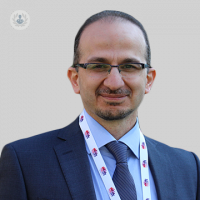Should patients with GORD get a sleeve gastrectomy?
Written in association with:Gastro-oesophageal reflux disease, or GORD, is a common long-term condition in which stomach acid leaks up into the oesophagus (reflux), causing symptoms such as heartburn, bloating, an unpleasant taste in the mouth, regurgitation and vomiting. Many factors can cause or contribute towards GORD, including weakening of the sphincter (the ring of muscle of the diaphragm) between the stomach and oesophagus and hiatus hernias (migration of the gastro-oesophageal junction from the abdomen up to the chest).
If a patient with GORD wants bariatric surgery, there are certain extra risks to consider. Mr Ali Alhamdani, top bariatric surgeon, speaks about his views on offering sleeve gastrectomy to these patients:
A few patients with gastro-oesophageal reflux disease with symptoms of heartburn, reflux and regurgitation, and upper abdominal pain have asked me if they can have sleeve gastrectomy as a bariatric procedure.
This is my advice to them:
I don't support the practice of offering sleeve gastrectomy with a background of gastro-oesophageal reflux disease (GORD) and hiatus hernia and augmenting that with a crural repair or Nissen fundoplication (a strengthening procedure for the weak gastro-oesophageal junction) for the following reasons:
1. Extra pressure can make reflux worse
We know that when we are replacing a low-pressure system (the large, open stomach before the operation) with a high-pressure system (caused by the tight sleeve tube after the operation), this can make acid reflux worse. The high pressure in the stomach combined with the hiatal hernia and the incompetent junction between the stomach and the oesophagus makes it easier for stomach acid to be refluxed into the oesophagus.
2. The Nissen and crural repair operation isn’t designed for a high pressure system
The operation to repair the gastro-oesophageal junction in non-obese patients with reflux disease (Nissen fundoplication or crural repair) is designed to counteract the reflux in a low-pressure system, the stomach. This operation is not designed to withstand the high pressure after sleeve gastrectomy with a smaller, tighter stomach.
3. The Nissen and crural repair operation tends to fail over time
Acid reflux has been known to start up again after sleeve gastrectomy in patients with normal and competent gastro-oesophageal junctions. The failure rate of the operation to repair the gastro-oesophageal junction following sleeve gastrectomy reached 70 per cent in 10 years according to some studies. Therefore, we cannot justify offering a refluxogenic operation (sleeve) to a patient with an existing gastro-oesophageal reflux disease even if we offer them the Nissen and the crural repair because of the high failure rate associated with that repair in those patients.
4. Data to the contrary can be misleading
Some studies have shown good results in patients with gastro-oesophageal reflux who are offered a sleeve gastrectomy and repair of the gastro-oesophageal junction. However, one of the misinterpreted pieces of data from such publications is that this data only covers the first few years after the operation. It does not follow the patients up to 10 years later, when failure often happens.
It is very important that the patient understand this point so the right choice of the operation is made, avoiding any unnecessary complications.
If you require bariatric surgery for GORD, visit Mr Alhamdani's Top Doctors profile to arrange an appointment.



